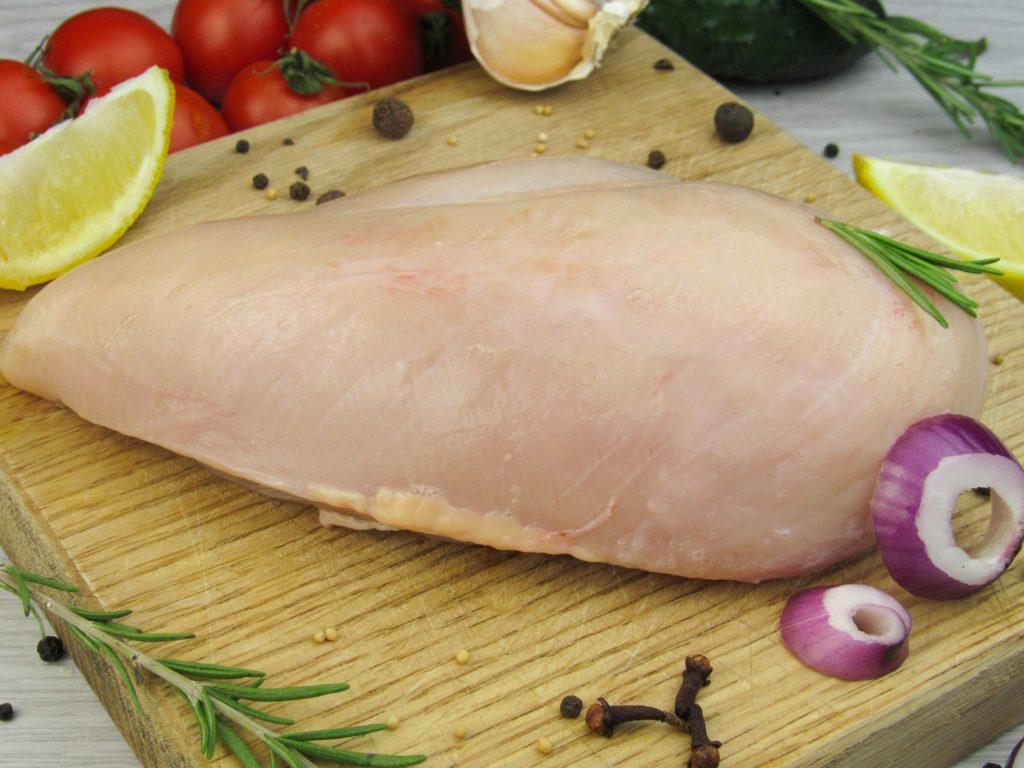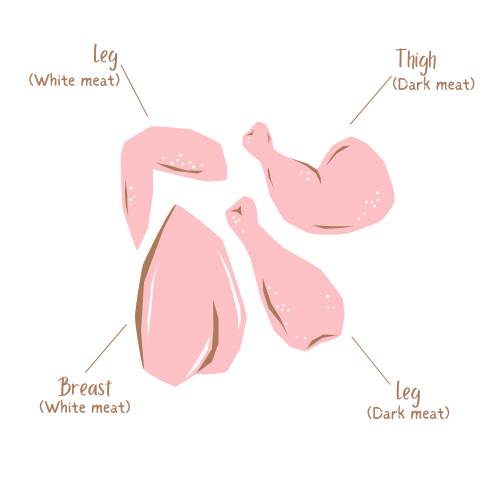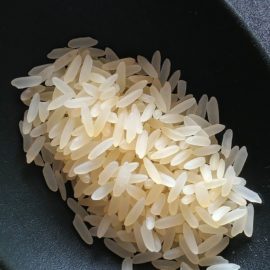
If you examine closely a whole chicken meat, the different parts can be distinguished by their color; there is white and dark meat. White chicken meat includes the wings, back, and breast, whereas the dark chicken meat includes the thigh and drumstick. But what are the differences between them? In this post, we’ll discuss the differences between white and dark chicken meat in terms of composition (color), taste, and nutrition.
DARK CHICKEN MEAT CONTAINS MYOGLOBIN
The levels of myoglobin dictates the color of meat. The levels vary depending on how often the muscle was used during activity when the animal was still alive. This also applies to other meats such as beef, pork, and lamb.
Myoglobin is a red-colored protein that binds or supplies oxygen in animal muscles. Oxygen is necessary for muscle contraction. The more worked the muscle, the more myoglobin and oxygen is supplied. This is the reason why the leg (drumstick) and thigh part in chicken meat become darker in color. Imagine all the power walking and running when the chicken was alive.
The wings and breast of chicken, on the other hand, are white meat because they are less worked. Chickens are birds that only fly short distances, and hence the wings are not worked as much. And the breast muscle only needs short burst of energy to assist in flapping the wings, and thus only need less oxygen and myoglobin.

In general, chicken meat is classified as white meat, which also includes turkey. Chicken meat typically contains only 0.05% of myoglobin, which makes it pinkish-white.
For more details about myoglobin, I have an article for it. Check it out here.
TASTE DIFFERENCE BETWEEN WHITE AND DARK CHICKEN MEAT
Here is one of the most asked questions regarding white and dark chicken meat. Which one is better, in terms of taste, white or dark chicken meat? Well, neither because it depends on one’s preference. As we have earlier learned, dark chicken meat contains more proteins in the form of myoglobin. In addition to that, dark meat contains more fat because of the multiple muscles present. Furthermore, many flavor compounds found in dark meat are fat-soluble. This makes the leg and thigh part tender, juicy, and flavorful when cooked. If you are someone who prefer stronger chicken flavor, then dark meat suits you better.
You might also like: 3 Reasons Why Wagyu Beef Is So Special (And Expensive)
Breast and wing part are known to have a milder taste. Nonetheless, white chicken meat is no pushover though. The best thing about white meat though is that they are very versatile during cooking. Because of their mild taste, they can be added in a wide variety of cuisines and produce different flavors. If you prefer chicken with a subtle taste, or wish to pair it with another ingredient, then you should go for white chicken meat.
In the United States and Europe, white chicken meat, particularly the breast part, is more preferred over dark meat. In fact, the bulk of dark chicken meat in the US is exported to other countries for the same reason. The wing (buffalo wing) and breast part are often prepared fried in these regions.
NUTRITIONAL PROFILE DIFFERENCE
Like the taste and color, there are also several differences between the two in terms of nutrition. But again, it boils down to one’s preference and need.
For most nutritionist and dieticians, white chicken meat is better because it contains less fat and calories. According to My Fitness Pal, a 3 ounce of white meat contains 147 calories and 4 grams of fat, whereas dark meat of the same amount contains 174 calories and 8 grams of fat. And when it comes protein, the difference is not that significant. The same serving of white meat contains 26 grams, while dark meat contains 23 grams. So if you are someone who wants to cut down on calorie and fat intake, then white chicken is a better option.
You might also like: Why You Should Not Freeze Meat At Home
Dark meat, on the hand, is better for individuals who are looking for essential vitamins and minerals. The leg and thigh part, as I mentioned earlier, require more myoglobin for physical activity. But myoglobin is more than just color. This protein also carries nutrients, particularly iron, a mineral that our body needs to produce hemoglobin. Dark meat contains 7.0 ppm of iron. This is twice as many as that in white meat, which contains 3.0 ppm of iron. Aside from iron, dark meat is also a good source of heart-healthy omega-3 fatty acids, since it contains more fat than white meat. It also contains more zinc, riboflavin (vitamin B2), thiamine (vitamin B1), and selenium.
Keep your dietary requirements in mind if you are more concerned about your health when deciding which type of meat to use for your meal.


